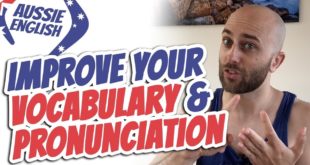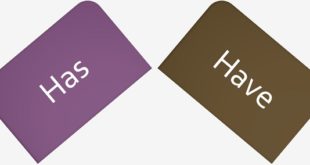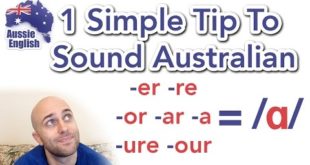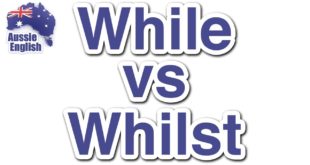In today’s episode we’ll learn about a finer point of English pronunciation with words that end in consonant sounds followed by pronouns me, you, him, her, us, them. The transcript of the episode is written below. So click play and read along as I speak to you guys in this latest episode!
Hey guys! Welcome to this episode of Aussie English. Today’s another pronunciation episode, and I thought today that I would do an episode on words ending in consonants [consonant sounds], so words that don’t end in vowels [vowel sounds] like “O”, “E”, “U”, “I”, “A”. Words that end in consonants like “T”, like “D”, like “H”, whatever it is, when they’re followed by pronouns. So, things like “me”, “you”, “him”, “her”, “us”, “them”, etc. So, let’s get started.
One thing I’ll mention before we start, and the reason for making this episode is that “me”, “you”, “him”, “her”, “us”, “them” changes slightly depending on the accent of the person and depending how quickly they speak they’ll often shorten some of these pronouns. Not all of them, but some of them.
So let’s dive in.
The first one I’ll go through with “got”, G-O-T, “got”, followed by the different pronouns.
“Got me”, it’s just “got me”, it doesn’t change.
“Got you” becomes “gotchu” or “gotcha”. So “got you” becomes “gotchu” or “gotcha”.
“Got him” becomes “got’im”, “got’im”.
“Got her” becomes “got’er”, “got’er”.
“Got us” becomes “got’us”, “got’us”. So with us, it’s more that the “u” [sound] just slightly becomes an “eh” [sound] “got’us”. “ehs”, “ehs”, “got’us”.
And then “got them” becomes “got’em”, “got’em”. So you can say the “t” [sound]. You could say it more as a “d” [sound]. It just becomes a “god’em”, “god’em”.
Ok, now we’ll do it with “with”. So the T-H there and then the pronoun after the T-H, “with”.
“With me”, stays “with me”.
“With you”, “With ya”.
“With him”, “with’im”.
“With her”, “with’er”.
“With us”, “with’us”.
“With them”, “with’em”.
Another one could be “sold”. The word “sold”, “to sell”. So you’ve sold someone something.
“Sold me”, “sold me”.
“Sold you”, and this is interesting. “Sold” ends with a “d” and when that’s combined with “you” it can become a “juw” sound or a “jah” sound. So “sold you”, “sold’ju”, “sold’ja”. “Sold you”, “sold’ju”, “sold’ja”.
“Sold him”, “sold’im”.
“Sold her”, “sold’er”.
“Sold us”, “Sold’us”.
“Sold them”, “sold’em”.
Now we’ll do one that ends in a “z” sound. Even though this words ends in “e”, “to seize”, but that’s just spelling. The actual when of the word is a “ss” or a “zz” sound. “Seize”.
So “seize me”, “seize me”. Doesn’t really change.
“Seize you”, “seize ya”.
“Seize him”, “Seize’im”.
“Seize her”, “seize’er”.
“Seize us”, “seize’us”.
“Seize them”, “seize’em”.
And so I should add that “seize” in this case, I was saying the word “S-E-I-Z-E”, “seize”. “To seize” something. It means to like grab or to confiscate something. But it just occurred to me that “to see”, as in to use your eyes “to see” is pronounced much the same way. So if it was “he sees something”, “he sees me”, “he sees ya”, “he sees’im”, “he sees’er”, “he sees’us”, “he sees’em”. It’s going to be pronounced in much the same way.
Ask.
“Ask me”, “ask me”.
“Ask you”, “ask ya”.
“Ask him”, “ask’im”.
“Ask her”, “ask’er”.
“Ask us”, “ask’us”.
“Ask them”, “ask’em”. So “can you ask’em?”
“Grab me”. So “grab” as in “grab onto”, “to hold”, “to seize”, “to grab”.
“Grab me”, “grab me”. Doesn’t change.
“Grab you”, “grab ya”.
“Grab him”, “grab’im”.
“Grab her”, “grab’er”.
“Grab us”, “grab’us”.
“Grab them”, “grab’em”.
And now we’ll do “stuff”. So “stuff” in Aussie English is often used as a way of saying “screw you” or “stuff you”, sort of like “get stuffed”. It’s hard to explain, but it’s sort of like. It’s sort of what you would say to someone if you wanted them to go away, you know “ah get stuffed”, “go away”, “I don’t believe you”, “bugger off”, “get stuffed”.
“Stuff me”, “stuff me”.
“Stuff you”, “stuff ya”.
“Stuff him”, “stuff’im”.
“Stuff her”, “stuff’er”.
“Stuff us”, “stuff’us”.
“Stuff them”, “stuff’em”.
Now let’s do one that ends in an “R”. “Bugger”.
“Bugger me”, “bugger me”.
“Bugger you”, “bugger ya”.
“Bugger him”, “bugger’im”.
“Bugger her”, “bugger’er”.
“Bugger us”, “bugger’us”.
“Bugger them”, “bugger’em”.
So that’s the episode for today guys. I just wanted to give you a little experience with how pronouns can sort of be abbreviated, shortened, after certain words, and to just give you some exercises that you can do. So you can listen over this. You can repeat after me and practice this pronunciation. It’ll be really good because you’re going to hear a lot of Australians speak like this. So if you want to improve your listening comprehension one of the best ways to do that is to practice using these words yourself because then they get ingrained into your head, and your… as soon as you hear them you’ll know exactly what the person’s saying. And secondly, it’s going to increase the fluidity of how you speak English.
So a lot of the… these sorts of abbreviations I imagine occur because it’s a lot easier to speak quickly when we make these abbreviations or these shortenings of words or changing in the sounds than if we were to try and annunciate everything perfectly as we speed up.
So those are two sort of reasons why I think this is important to practice, to get some exposure to. And, you know, don’t focus all your time on learning this but definitely play with it every now and then, have a listen, and soon enough you’ll naturally start using and understanding these kinds of pronunciation tips and tricks.
 ایرانیان استرالیا Australia Iran بزرگترین جامعه ایرانیان ساکن استرالیا Australia Iran
ایرانیان استرالیا Australia Iran بزرگترین جامعه ایرانیان ساکن استرالیا Australia Iran











